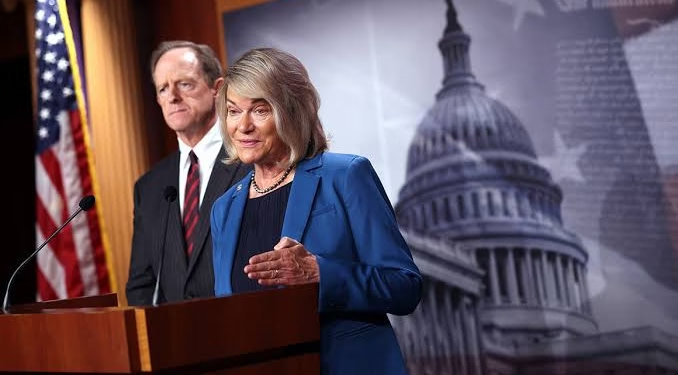Senior Democratic senators will meet with CEOs from Coinbase, Ripple, and Uniswap on October 22 in an urgent attempt to salvage bipartisan crypto legislation after a leaked DeFi regulatory proposal triggered industry-wide backlash last month.
The closed-door roundtable, led by Sen. Kirsten Gillibrand (D-NY), represents Democrats’ most significant outreach to the crypto sector in 2025—and possibly their last chance to advance digital asset legislation before Congress adjourns.
The Democratic lawmakers crypto roundtable comes amid growing frustration in both Washington and Silicon Valley over stalled negotiations and a recent backlash to a leaked Democratic DeFi proposal that critics say would impose excessive restrictions on decentralized platforms.
“This discussion is essential to bridging the gap between policymakers and innovators,” said Dante Disparte, Chief Strategy Officer at Circle. “Constructive dialogue is the only path to a regulatory framework that protects consumers without stifling progress.”
Senators and executives unite amid mounting pressure
The Democratic lawmakers crypto roundtable will be one of the most significant direct engagements between policymakers and industry leaders this year. Expected attendees include Coinbase CEO Brian Armstrong, Chainlink co-founder Sergey Nazarov, Galaxy Digital CEO Mike Novogratz, Kraken CEO David Ripley, Uniswap founder Hayden Adams, Ripple’s Chief Legal Officer Stuart Alderoty, and Circle’s Dante Disparte.
Sen. Gillibrand, who co-authored the Responsible Financial Innovation Act with Republican Sen. Cynthia Lummis (R-WY), has positioned the meeting as an effort to reset discussions after partisan negotiations broke down earlier this month.
Joining her will be fellow Democrats Sen. Cory Booker (D-NJ), Sen. Mark Warner (D-VA), and Sen. John Hickenlooper (D-CO) — all of whom have advocated for expanding the Commodity Futures Trading Commission (CFTC)’s authority over digital assets and creating clearer compliance rules for DeFi protocols.
“The current regulatory vacuum helps no one,” said Hayden Adams, founder of Uniswap Labs. “Developers need certainty, and investors need protection. The Democratic lawmakers crypto roundtable is a step toward achieving both.”
Renewed push after DeFi proposal backlash
The Democratic lawmakers crypto roundtable follows intense criticism over a leaked DeFi draft proposal circulated among Democratic staffers in late September. The document, which was never formally introduced, drew sharp pushback from the crypto community and several Republican lawmakers, who argued that it would effectively outlaw key elements of decentralized finance and self-custody wallets.
In response, more than 20 industry firms including Chainlink, VanEck, and Binance.US signed a joint coalition letter urging lawmakers to adopt “bright line” definitions that distinguish between centralized intermediaries and decentralized protocols. The letter emphasized that regulatory clarity must not come at the expense of innovation.
“Banning or over-regulating DeFi would push talent and capital abroad,” warned Brian Armstrong, CEO of Coinbase, in a post on X. “The U.S. should lead in creating smart, innovation-friendly rules not drive builders out.”
The Democratic lawmakers crypto roundtable aims to repair those strained relations by fostering open dialogue between policymakers and the crypto sector. Observers note that Gillibrand’s pragmatic approach could help reestablish bipartisan momentum before Congress adjourns for the year.
What’s at stake for the digital asset industry
The October 22 Democratic lawmakers crypto roundtable may determine whether a comprehensive digital asset market structure bill advances in the current legislative session. Analysts describe the event as an “inflection point” as a chance for Democrats to demonstrate good faith after months of internal division and industry skepticism.
While no legislative text is expected to emerge immediately, insiders say the discussions could shape future policy priorities for both the Senate Agriculture Committee (which oversees the CFTC) and the Senate Banking Committee (responsible for the SEC).
“This is not just another meeting,” said Kristin Smith, CEO of the Blockchain Association. “It’s a signal that lawmakers are listening and that meaningful collaboration is still possible. The outcome of this Democratic lawmakers crypto roundtable could influence digital asset policy for years to come.”
With mounting international competition from Europe’s Markets in Crypto-Assets (MiCA) framework to Hong Kong’s licensing reforms U.S. policymakers face growing pressure to deliver a coherent regulatory regime that balances innovation with consumer protection.
As global capital continues to flow into decentralized systems, the Democratic lawmakers crypto roundtable represents a critical test of whether Washington can adapt to the realities of a blockchain-driven economy.
Path forward: Dialogue, not division
The Democratic lawmakers crypto roundtable underscores a renewed recognition that cooperation, not confrontation, is the key to progress in digital asset regulation. For both lawmakers and industry players, the upcoming discussions could redefine the tone of crypto policy in 2025 and beyond.
As Sen. Gillibrand prepares to convene the group, expectations remain high that this effort will bridge divides and lay the groundwork for a transparent, innovation-friendly framework that finally brings clarity to America’s crypto markets.
Getting this right is about more than finance, said Sergey Nazarov, co-founder of Chainlink. It’s about ensuring the United States remains a global leader in technological innovation.
Whether this Democratic lawmakers crypto roundtable succeeds may depend not on the headlines it generates, but on the groundwork it lays for genuine bipartisan reform.











